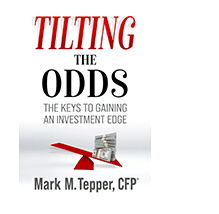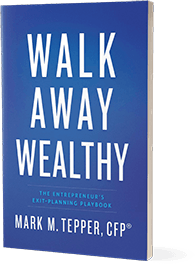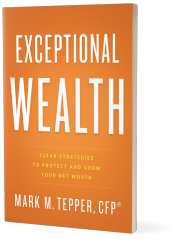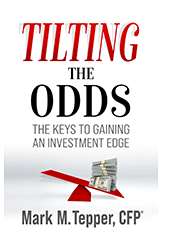What should your post-crisis investment playbook look like? How should you adapt your portfolio to fit the “new normal” that we’re engrossed in? There will be clear winners and losers moving forward. Absent a cure or vaccine for COVID-19, you can’t expect stocks to get to levels they were before this. You’re going to need a different investment strategy. In this episode of The Capitalist Investor, we talk about the 5 things you need to do to adjust your portfolio to the new normal.
Outline of This Episode
- [1:58] 5 Ways to transition into the new normal
- [3:45] #1: Reposition your holdings
- [10:57] #2: Cancel your autopilot
- [14:28] #3: Be tactical with your decisions
- [17:19] #4: stress-test your portfolio
- [20:27] #5: Make a financial plan
#1: Reposition your Holdings
There will be winners and losers on the other side of this crisis. Who is a clear winner? Amazon. All of the stimulus money from the Fed either went to grocery stores or Amazon. Some clear losers include Macy, Kohl’s, Nordstrom and other big-box stores.
Airlines, cruise lines, and hotel stocks are all risky. They could emerge healthy—but do you wanna bet the farm on that? TSA traffic was down 80%. LAX is empty. Buying into these is a pure gamble. There is a reason airline seats have been so small. A 70% capacity model doesn’t work for them.
So what do we recommend? People should come up with a list of their favorite stocks in themes that you have conviction in. Something that will survive and thrive through the crisis that you will be excited to invest in. Wait for positions to fall into your lap at a price you’d be comfortable with.
#2: Cancel your autopilot
It’s a common practice to pick a target-date mutual fund based on whenever you retire. You set it and forget it. But we believe now is NOT the time to be doing that. Academically, looking backward, it works. Is it going to work right now? Maybe—but maybe not. It’s better to position your portfolio in the asset classes that have the best risk-reward profile for you over the course of the next few years.
There’s nothing that says you have to have a certain percentage in particular asset classes. If you’re approaching retirement you’re in a different investing stage in your life. One of the most important things you can do is reduce your volatility as much as possible.You need to understand what your goals are and properly address them—which can’t be done on autopilot.
#3: Be tactical with your decisions
We recommend you overweight and underweight specific sectors in your holdings. We typically overweight tech and operate on the premise that it will continue to be a winner. We also overweight healthcare. Once we have a solution for COVID-19, we still need to cure cancer. We still have an aging population (65+ is growing at 3x the pace of the under-65 crowd over the next 10 years) who need access to healthcare. There are tactical decisions that you can make to position your portfolio for success. What do we underweight? What do we avoid investing in altogether? Keep listening to find out.
#4: Stress-test your portfolio
You need to run a stress-test on your portfolio. In a typical stress test, we look at your holdings, analyze them, and assess your risk, sector overweights/underweights, and discuss why you’re doing what you’re doing. We will look at whether or not it will work in the new normal. You need to figure out where the problems are and find opportunities that you’re not taking advantage of to right your ship. We don’t know what will happen in the market day-to-day, so your portfolio must match the amount of risk you’re willing to take. Email us or reach out to us to connect about doing a stress-test of your portfolio.
#5: Make a financial plan
This is the #1 thing you should do for your future. You need to know where your risk tolerance should be. Everyone comes to our office to help them make as much money as possible with the least amount of risk. It’s what everyone wants, right? But we need to know what you’re shooting for. A financial plan will tell you that.
If you’re 62 and retiring at 65—you understand the value of having a financial plan and reviewing it annually. Someone who is 40 doesn’t necessarily understand that value. Do they need to update their financial plan every year? You may end up seeing unrealistic predictions, but it at least tells you if you’re headed in the right direction.
What’s more important in the annual planning review is making sure your current position is correct. Maybe what you’re doing with your life insurance, income, and pension plans need to be revisited. You don’t need to be 3 months from retirement to build out a financial plan. The earlier that you can do it the better off you’ll be.
To hear the rest of our discussion around the topic on what you can be doing to ready your portfolio for the new normal, listen to the whole episode!
Resources & People Mentioned
- Check out our YouTube Channel!
Connect with Derek Gabrielsen
- Twitter: @DerekGabrielsen
- Follow Derek on LinkedIn
- Send Derek a message here
Connect With Mark Tepper
- Twitter: @MarkTepperSWP
- Follow Mark on LinkedIn
- Send Mark a message here
Send your questions and comments to us at info@SWPConnect.com
Subscribe to The Capitalist Investor
Show Notes by
PODCAST FAST TRACK
https://www.podcastfasttrack.com
 Enter your information below, and we will email you our new eBook, Tilting the Odds
Enter your information below, and we will email you our new eBook, Tilting the Odds




